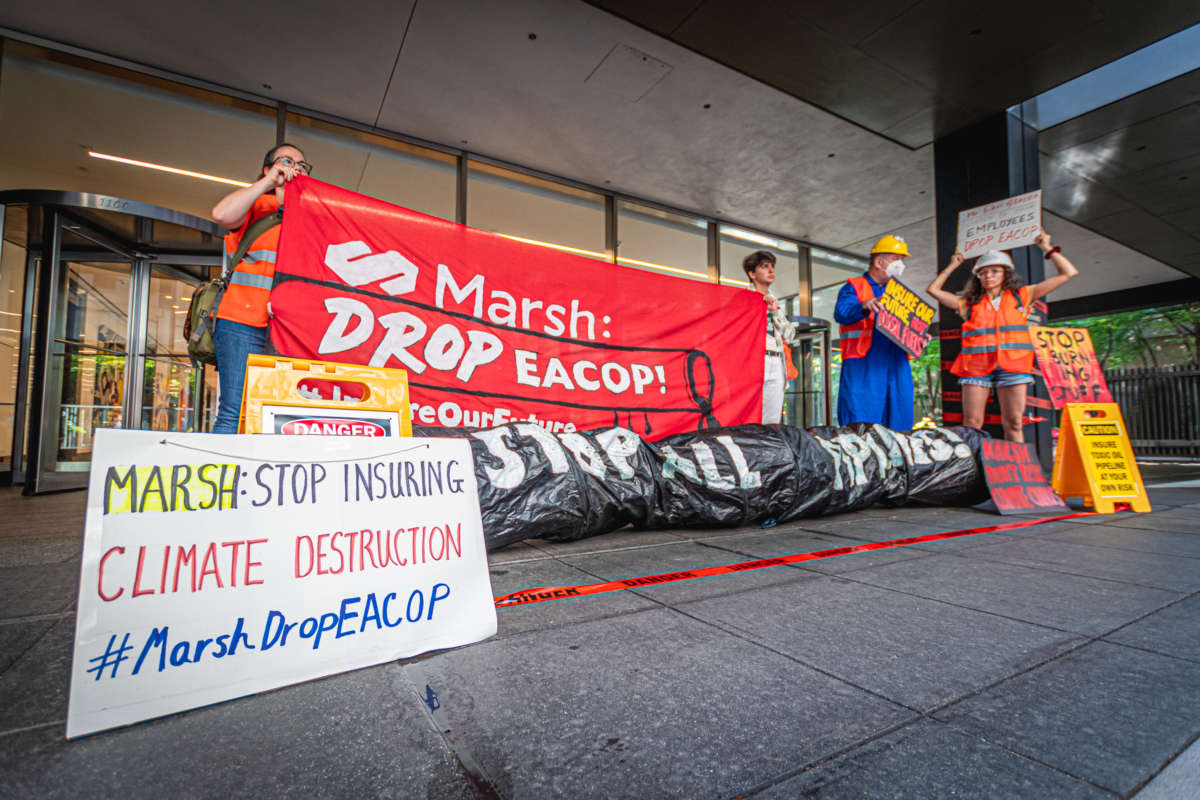Honest, paywall-free news is rare. Please support our boldly independent journalism with a donation of any size.
A new analysis released Thursday by a climate research firm reveals environmental assessments used to gain approval for the East African Crude Oil Pipeline in Uganda and Tanzania failed to fully consider the massive amount of fossil fuel emissions that will result from the project.
The earlier assessments took into account only the construction and operation of the pipeline, known as EACOP, but failed to take into account the emissions which will result from the international transport, refining, and burning of the 848 million barrels of oil that the project will carry over its 25-year lifespan.
Climate campaigners have opposed the project which has already displaced thousands of people and threatens the livelihoods of millions.
In its new analysis, the Climate Accountability Institute (CAI) looked at expected emissions from tanker transport from Port Tanga in Tanzania through the Suez Canal to Rotterdam (and return), refining of the waxy crude oil into petroleum products, and end-use consumption of the carbon fuels,” and found that EACOP will be directly linked to 379 million tonnes of carbon emissions — more than 25 times the current annual emissions of Uganda and Tanzania.
CAI’s findings qualify EACOP as a “mid-sized carbon bomb,” Richard Heede, who leads the group’s Carbon Majors project, told The Guardian. A carbon bomb is defined as an extraction project which has the capacity to emit at least one billion tonnes of carbon.
“It is time for TotalEnergies to abandon the monstrous EACOP that promises to worsen the climate crisis, waste billions of dollars that could be used for good, [and] bring mayhem to human settlements and wildlife along the pipeline’s path,” Heede told The Guardian.
The earlier analysis that was accepted by the host governments detailed just 1.8% of the project’s total emissions.
The French oil company TotalEnergies and the China National Offshore Oil Corporation (CNOOC) are behind the project, with Total planning to invest between $3.5 billion and $5 billion in the pipeline despite, according to CAI, its “repeated public assurances that the company is decarbonizing its portfolio in alignment with the Paris Agreement.”
“EACOP is an ill-advised project whose impact on communities in Uganda and Tanzania, wildlife, and the planet will be devastating, as the project’s lead Total Energies stand to gain,” said Omar Elmawi, coordinator for the Stop EACOP campaign. “We must continue to push for a stop to this and other such projects.”
CAI’s analysis was released on the same day that the United Nations Environmental Program (UNEP) warned that “only an urgent system-wide transformation can avoid an accelerating climate disaster” and that continuing to extract fossil fuels will put the planet on a pathway to grow 2.8°C hotter by the end of century.
The report also comes as 350Africa.org and the Stop EACOP coalition are preparing to release a new documentary film, EACOP: A Crude Reality, which features the stories of climate campaigners who are fighting against the project and some of the thousands of people who have been evicted or economically displaced because of the pipeline.
“I lose my entire home with my family because they refuse to resettle me,” one man says in the film, which is scheduled to be released Sunday. “They told me I should take cash compensation.”
The stories within the film “are a testament to the impunity with which fossil fuel corporations such as Total Energies operate, as they realize huge profits at the expense of people and the environment,” said Hilda Nakabuye, a climate campaigner in Uganda.
“Harmful projects such as EACOP should have no place in the future of the continent,” she added. “Instead the government of Uganda and Tanzania supported by the developed nations should create sustainable, inclusive, and diversified economic opportunities and energy solutions that directly benefit Ugandans and Tanzanians and protect their basic rights, livelihoods, environment, and future.”
Climate advocates have successfully pressured 24 banks and 18 insurers to pledge that they will not support EACOP. Climate action groups across Africa plan to hold public screenings of the film, which will be available here starting Sunday.
A terrifying moment. We appeal for your support.
In the last weeks, we have witnessed an authoritarian assault on communities in Minnesota and across the nation.
The need for truthful, grassroots reporting is urgent at this cataclysmic historical moment. Yet, Trump-aligned billionaires and other allies have taken over many legacy media outlets — the culmination of a decades-long campaign to place control of the narrative into the hands of the political right.
We refuse to let Trump’s blatant propaganda machine go unchecked. Untethered to corporate ownership or advertisers, Truthout remains fearless in our reporting and our determination to use journalism as a tool for justice.
But we need your help just to fund our basic expenses. Over 80 percent of Truthout’s funding comes from small individual donations from our community of readers, and over a third of our total budget is supported by recurring monthly donors.
Truthout has launched a fundraiser to add 379 new monthly donors in the next 6 days. Whether you can make a small monthly donation or a larger one-time gift, Truthout only works with your support.
